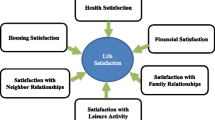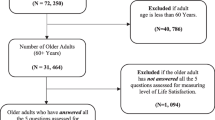Abstract
Little research exists that explores which domains of life satisfaction contributed to life satisfaction among Korean older adults with a physical disability. The purpose of this study was to investigate which domains of life satisfaction predicted life satisfaction by the identified different age groups among Korean older adults with a physical disability. This study analyzed the Panel Survey of Employment for the Disabled (PSED) collected in 2015 in Korea. A total of 2331 participants were used and examined their socio-demographic status, the satisfaction of life domains (social, health, finance, leisure, work and marital), and the overall life satisfaction. The results show that marital and employment statuses play an important role in promoting the overall life satisfaction for adults and older adults with a physical disability. In addition, this study suggests that the social and leisure satisfaction of an individual are the major contribution to life satisfaction among older adults (aged 55 and over) who have a physical disability.
Similar content being viewed by others
References
Abed, Y., Asghar Nezhad, A., & Hatami, H. (2015). Compatibility and marital satisfaction in disabled couples compared to healthy ones. Iranian Rehabilitation Journal, 13(2), 23–27.
Anderson, C. J., Krajci, K. A., & Vogel, L. C. (2002). Life satisfaction in adults with pediatric-onset spinal cord injuries. The Journal of Spinal Cord Medicine, 25(3), 184–190.
Bierman, A., & Statland, D. (2010). Timing, social support, and the effects of physical limitations on psychological distress in late life. Journals of Gerontology. Series B, Psychological Sciences and Social Sciences, 65(5), 631–639.
Bullock, C. C., & Mahon, M. J. (1997). Introduction to recreation services for people with disabilities: a person-centered approach. Champaign, IL: Sagamore Publishing.
Byun, E., Caillier, S. J., Montalban, X., Villoslada, P., Fernández, O., Brassat, D., & Oksenberg, J. R. (2008). Genome-wide pharmacogenomic analysis of the response to interferon beta therapy in multiple sclerosis. Archives of Neurology, 65(3), 337–344.
Chan, R. C. (2000). How does spinal cord injury affect marital relationship? A story from both sides of the couple. Disability and Rehabilitation, 22(17), 764–775.
Chen, Y., Anderson, C. J., Vogel, L. C., Chlan, K. M., Betz, R. R., & McDonald, C. M. (2008). Change in life satisfaction of adults with pediatric-onset spinal cord injury. Archives of Physical Medicine and Rehabilitation, 89(12), 2285–2292.
Cho, H. J., Park, J. K., & Park, L. E. (2015). An exploratory study on the factors influencing on life satisfaction of workers with physical disabilities. Korean Journal of Physical, Multiple, & Health Disabilities, 53(2), 203–227.
Depp, C. A., & Jeste, D. V. (2006). Definitions and predictors of successful aging: a comprehensive review of larger quantitative studies. The American Journal of Geriatric Psychiatry, 14(1), 6–20.
Fernández-Ballesteros, R., Zamarrón, M. D., & Ruíz, M. A. (2001). The contribution of socio-demographic and psychosocial factors to life satisfaction. Ageing and Society, 21(1), 25–43. https://doi.org/10.1017/S0144686X01008078.
Gillespie, B. J., Lever, J., Frederick, D., & Royce, T. (2015). Close adult friendships, gender, and the life cycle. Journal of Social and Personal Relationships, 32(6), 709–736. https://doi.org/10.1177/0265407514546977.
Hampton, N. Z. (2004). Subjective well-being among people with spinal cord injuries: the role of self-efficacy, perceived social support, and perceived health. Rehabilitation Counseling Bulletin, 48(1), 31–37.
Haybron, D. M. (2007). Life satisfaction, ethical reflection and the science of happiness. Journal of Happiness Studies, 8(1), 99–138.
Hooyman, N. R., & Kiyak, H. A. (1993). Social gerontology. Boston: Allyn and Bacon.
Jalayondeja, C., Jalayondeja, W., Suttiwong, J., Sullivan, P. E., & Nilanthi, D. L. (2016). Physical activity, self-esteem, and quality of life among people with physical disability. The Southeast Asian Journal of Tropical Medicine and Public Health, 47(47), 546–558.
Johnson, C. L., Resch, J. A., Elliott, T. R., Villarreal, V., Kwok, O. M., Berry, J. W., & Underhill, A. T. (2010). Family satisfaction predicts life satisfaction trajectories over the first 5 years after traumatic brain injury. Rehabilitation Psychology, 55(2), 180–187.
Kennedy, J., & Minkler, M. (1998). Disability theory and public policy: implications for critical gerontology. International Journal of Health Services, 28(4), 757–776.
Kim, H., Hong, S., & Kim, M. (2015). Living arrangement, social connectedness, and life satisfaction among Korean older adults with physical disabilities: the results from the national survey on persons with disabilities. Journal of Developmental and Physical Disabilities, 27(3), 307–321. https://doi.org/10.1007/s10882-014-9418-9.
Kim, J., Kim, M., MaloneBeach, E. E., & Han, A. (2016). A study of health perception, disability acceptance, and life satisfaction based on types of leisure activities among Koreans with a physical disability. Applied Journal of Quality of Life. https://doi.org/10.1007/s11482-015-9397-8.
Kinney, W. B., & Coyle, C. P. (1992). Predicting life satisfaction among adults with physical disabilities. Archives of Physical Medicine and Rehabilitation, 73(9), 863–869.
KOSIS (2013). Korean Statistical Information Service. http://kosis.kr/eng/statisticsList/statisticsList_01List.jsp?vwcd=MT_ETITLE&parentId=A.
Luger, T., Cotter, K. A., & Sherman, A. M. (2009). It's all in how you view it: pessimism, social relations, and life satisfaction in older adults with osteoarthritis. Aging & Mental Health, 13(5), 635–647.
Minnock, P., Fitzgerald, O., & Bresnihan, B. (2003). Quality of life, social support, and knowledge of disease in women with rheumatoid arthritis. Arthritis Care & Research, 49(2), 221–227.
Moi, A. L., Wentzel-Larsen, T., Salemark, L., Wahl, A. K., & Hanestad, B. R. (2006). Impaired generic health status but perception of good quality of life in survivors of burn injury. Journal of Trauma and Acute Care Surgery, 61(4), 961–969.
Pagán, R. (2013). Job satisfaction and domains of job satisfaction for older workers with disabilities in Europe. Journal of Happiness Studies, 14(3), 861–891.
Pagán, R., & Malo, M. Á. (2009). Job satisfaction and disability: lower expectations about jobs or a matter of health? Spanish Economic Review, 11(1), 51–74.
Park, J. K. (2015). The acceptance of a disability and the life satisfaction of individuals with server physical disabilities. Korean Journal of Physical, Multiple, & Health Disabilities, 58(1), 1–28.
Powrie, B., Kolehmainen, N., Turpin, M., Ziviani, J., & Copley, J. (2015). The meaning of leisure for children and young people with physical disabilities: a systematic evidence synthesis. Developmental Medicine and Child Neurology, 57(11), 993–1010.
Pressman, S. D., Matthews, K. A., Cohen, S., Martire, L. M., Scheier, M., Baum, A., & Schulz, R. (2009). Association of enjoyable leisure activities with psychological and physical well-being. Psychosomatic Medicine, 71(7), 725–732.
Priestley, M., & Rabiee, P. (2002). Same difference? Older people’s organisations and disability issues. Disability & Society, 17(6), 597–611.
Pruchno, R. A., Wilson-Genderson, M., & Cartwright, F. (2010). A two-factor model of successful aging. The Journals of Gerontology. Series B, Psychological Sciences and Social Sciences, 65(6), 671–679.
Putzke, J., Richards, J., Hicken, B., & DeVivo, M. (2002). Predictors of life satisfaction: a spinal cord injury cohort study. Archives of Physical Medicine and Rehabilitation, 83(4), 555–561.
Puvill, T., Lindenberg, J., de Craen, A. J., Slaets, J. P., & Westendorp, R. G. (2016). Impact of physical and mental health on life satisfaction in old age: a population based observational study. BMC Geriatrics, 16(1), 194.
Reitzes, D. C., & Mutran, E. J. (2006). Self and health: factors that encourage self-esteem and functional health. The Journals of Gerontology Series B: Psychological Sciences and Social Sciences, 61(1), S44–S51.
Sardareie, A. (2007). Editor Comparison of depressed veterans of Islamic Revolution with posttraumatic stress disorder. Proceedings of the Congress of Military Medicine; 2007; Tehran: Baghiatolah University.
Steptoe, A., Deaton, A., & Stone, A. A. (2015). Subjective wellbeing, health, and ageing. The Lancet, 385(9968), 640–648.
Suh, E. M., & Oishi, S. (2004). Culture and subjective well-being: introduction to the special issue. Journal of Happiness Studies, 5(3), 219–222.
Tabachnick, B. G., & Fidell, L. S. (1996). Using multivariate statistics, (3rd edn). New York: Harper Collins.
Tabachnick, B. G., & Fidell, L. S. (2001). Using multivariate statistics, 4th Edn. Boston: Allyn and Bacon.
Tedeschi, R. G., & Calhoun, L. G. (2004). Target Article: "Posttraumatic Growth: Conceptual Foundations and Empirical Evidence". Psychological Inquiry, 15(1), 1-18.
van Campen, C., & Cardol, M. (2009). When work and satisfaction with life do not go hand in hand: health barriers and personal resources in the participation of people with chronic physical disabilities. Social Science & Medicine, 69(1), 56–60.
van Leeuwen, C. C., Post, M. M., van Asbeck, F. A., Bongers-Janssen, H. H., van der Woude, V., de Groot, S., & Lindeman, E. (2012). Life satisfaction in people with spinal cord injury during the first five years after discharge from inpatient rehabilitation. Disability And Rehabilitation: An International, Multidisciplinary Journal, 34(1), 76–83.
Wikman, A., Wardle, J., & Steptoe, A. (2011). Quality of life and affective well-being in middle-aged and older people with chronic medical illnesses: a cross-sectional population based study. PLoS One, 6(4), e18952.
Yazicioglu, K., Yavuz, F., Goktepe, A. S., & Tan, A. K. (2012). Research paper: influence of adapted sports on quality of life and life satisfaction in sport participants and non-sport participants with physical disabilities. Disability and Health Journal, 5249–5253. https://doi.org/10.1016/j.dhjo.2012.05.003.
Zimmer, Z., & Lin, H. S. (1996). Leisure activity and well-being among the elderly in Taiwan: testing hypotheses in an Asian setting. Journal of Cross-Cultural Gerontology, 11(2), 167–186.
Author information
Authors and Affiliations
Corresponding author
Ethics declarations
Funding
This is not a funded project.
Ethical Approval
This article does not contain any studies with human participants performed by any of the authors as we used a secondary data set.
Informed Consent
This study used secondary data which is not individually identifiable and therefore our analysis would not involve human subjects.
Conflict of Interest
There is no conflict of interest in this study.
Additional information
It has been read and approved by the authors and it has not been published or accepted for publication elsewhere.
Rights and permissions
About this article
Cite this article
Kim, J., Lee, C. & Ji, M. Investigating the Domains of Life Satisfaction in Middle-Aged, Late Middle-Aged, and Older Adults with a Physical Disability. J Dev Phys Disabil 30, 639–652 (2018). https://doi.org/10.1007/s10882-018-9609-x
Published:
Issue Date:
DOI: https://doi.org/10.1007/s10882-018-9609-x




